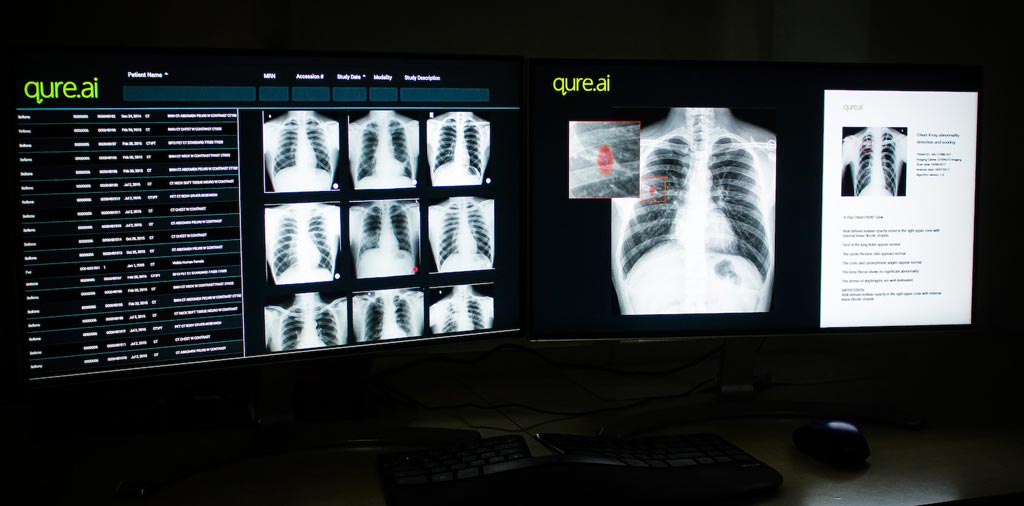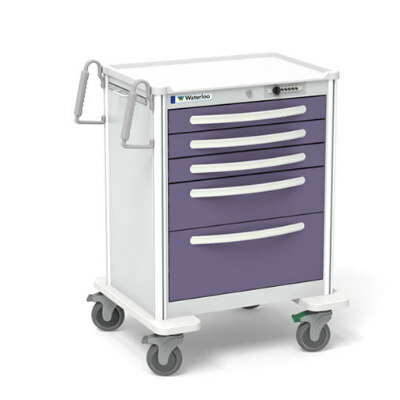AI-based Interpretation Tool Receives CE Certification
|
By HospiMedica International staff writers Posted on 07 Jun 2018 |

Image: The qXR AI-based chest X-ray interpretation tool has received CE certification (Photo courtesy of Qure.ai).
qXR, an AI-based chest X-ray interpretation tool that detects 15 of the most common chest X-ray abnormalities with an accuracy of more than 90%, has received CE certification. Developed by healthcare AI start-up Qure.ai (Maharashtra, India), qXR has been trained on more than one million chest X-rays and uses a heat map or bounding box to point out abnormalities to the clinician, aiding rapid confirmation in just milliseconds.
Qure.ai's deep neural networks can understand and interpret medical images with unprecedented accuracy and enable machines to perform routine diagnostics, thus improving healthcare outcomes and costs. The company has developed qXR as part of its line-up of deep learning products for radiology, which include automated interpretation algorithms for head CT scans, brain and musculoskeletal MRIs.
qXR is already being used globally as a screening tool for tuberculosis in settings without trained healthcare professionals. qXR can significantly speed-up the tuberculosis diagnosis protocol by screening chest X-rays in milliseconds. Qure.ai has also released a web-based interface at scan.qure.ai that allows radiologists to test the performance of qXR by providing users with real-time interpretation of chest X-rays.
"The chest X-ray is the most commonly performed radiology investigation, but one of the toughest to interpret," said Dr. Shalini Govil, Quality Controller for the Columbia Asia Radiology Group. "Qure.ai's solution could serve as a radiology assistant, providing a draft report that can be validated by a physician or radiologist. They've also come up with technology to visualize what the algorithm sees - a way to 'see through the computer's eyes.' I think this will be a game-changer on the road to building confidence in AI."
"We're excited to announce this certification, which clears our path to market in many geographies," said Prashant Warier, Co-Founder and CEO of Qure.ai. "qXR can help doctors quickly and accurately detect and highlight abnormalities, reducing the chances of a missed diagnosis."
Related Links:
Qure.ai
Qure.ai's deep neural networks can understand and interpret medical images with unprecedented accuracy and enable machines to perform routine diagnostics, thus improving healthcare outcomes and costs. The company has developed qXR as part of its line-up of deep learning products for radiology, which include automated interpretation algorithms for head CT scans, brain and musculoskeletal MRIs.
qXR is already being used globally as a screening tool for tuberculosis in settings without trained healthcare professionals. qXR can significantly speed-up the tuberculosis diagnosis protocol by screening chest X-rays in milliseconds. Qure.ai has also released a web-based interface at scan.qure.ai that allows radiologists to test the performance of qXR by providing users with real-time interpretation of chest X-rays.
"The chest X-ray is the most commonly performed radiology investigation, but one of the toughest to interpret," said Dr. Shalini Govil, Quality Controller for the Columbia Asia Radiology Group. "Qure.ai's solution could serve as a radiology assistant, providing a draft report that can be validated by a physician or radiologist. They've also come up with technology to visualize what the algorithm sees - a way to 'see through the computer's eyes.' I think this will be a game-changer on the road to building confidence in AI."
"We're excited to announce this certification, which clears our path to market in many geographies," said Prashant Warier, Co-Founder and CEO of Qure.ai. "qXR can help doctors quickly and accurately detect and highlight abnormalities, reducing the chances of a missed diagnosis."
Related Links:
Qure.ai
Channels
Artificial Intelligence
view channel
AI-Powered Algorithm to Revolutionize Detection of Atrial Fibrillation
Atrial fibrillation (AFib), a condition characterized by an irregular and often rapid heart rate, is linked to increased risks of stroke and heart failure. This is because the irregular heartbeat in AFib... Read more
AI Diagnostic Tool Accurately Detects Valvular Disorders Often Missed by Doctors
Doctors generally use stethoscopes to listen for the characteristic lub-dub sounds made by heart valves opening and closing. They also listen for less prominent sounds that indicate problems with these valves.... Read moreCritical Care
view channel
Powerful AI Risk Assessment Tool Predicts Outcomes in Heart Failure Patients
Heart failure is a serious condition where the heart cannot pump sufficient blood to meet the body's needs, leading to symptoms like fatigue, weakness, and swelling in the legs and feet, and it can ultimately... Read more
Peptide-Based Hydrogels Repair Damaged Organs and Tissues On-The-Spot
Scientists have ingeniously combined biomedical expertise with nature-inspired engineering to develop a jelly-like material that holds significant promise for immediate repairs to a wide variety of damaged... Read more
One-Hour Endoscopic Procedure Could Eliminate Need for Insulin for Type 2 Diabetes
Over 37 million Americans are diagnosed with diabetes, and more than 90% of these cases are Type 2 diabetes. This form of diabetes is most commonly seen in individuals over 45, though an increasing number... Read moreSurgical Techniques
view channel
Miniaturized Implantable Multi-Sensors Device to Monitor Vessels Health
Researchers have embarked on a project to develop a multi-sensing device that can be implanted into blood vessels like peripheral veins or arteries to monitor a range of bodily parameters and overall health status.... Read more
Tiny Robots Made Out Of Carbon Could Conduct Colonoscopy, Pelvic Exam or Blood Test
Researchers at the University of Alberta (Edmonton, AB, Canada) are developing cutting-edge robots so tiny that they are invisible to the naked eye but are capable of traveling through the human body to... Read more
Miniaturized Ultrasonic Scalpel Enables Faster and Safer Robotic-Assisted Surgery
Robot-assisted surgery (RAS) has gained significant popularity in recent years and is now extensively used across various surgical fields such as urology, gynecology, and cardiology. These surgeries, performed... Read morePatient Care
view channelFirst-Of-Its-Kind Portable Germicidal Light Technology Disinfects High-Touch Clinical Surfaces in Seconds
Reducing healthcare-acquired infections (HAIs) remains a pressing issue within global healthcare systems. In the United States alone, 1.7 million patients contract HAIs annually, leading to approximately... Read more
Surgical Capacity Optimization Solution Helps Hospitals Boost OR Utilization
An innovative solution has the capability to transform surgical capacity utilization by targeting the root cause of surgical block time inefficiencies. Fujitsu Limited’s (Tokyo, Japan) Surgical Capacity... Read more
Game-Changing Innovation in Surgical Instrument Sterilization Significantly Improves OR Throughput
A groundbreaking innovation enables hospitals to significantly improve instrument processing time and throughput in operating rooms (ORs) and sterile processing departments. Turbett Surgical, Inc.... Read moreHealth IT
view channel
Machine Learning Model Improves Mortality Risk Prediction for Cardiac Surgery Patients
Machine learning algorithms have been deployed to create predictive models in various medical fields, with some demonstrating improved outcomes compared to their standard-of-care counterparts.... Read more
Strategic Collaboration to Develop and Integrate Generative AI into Healthcare
Top industry experts have underscored the immediate requirement for healthcare systems and hospitals to respond to severe cost and margin pressures. Close to half of U.S. hospitals ended 2022 in the red... Read more
AI-Enabled Operating Rooms Solution Helps Hospitals Maximize Utilization and Unlock Capacity
For healthcare organizations, optimizing operating room (OR) utilization during prime time hours is a complex challenge. Surgeons and clinics face difficulties in finding available slots for booking cases,... Read more
AI Predicts Pancreatic Cancer Three Years before Diagnosis from Patients’ Medical Records
Screening for common cancers like breast, cervix, and prostate cancer relies on relatively simple and highly effective techniques, such as mammograms, Pap smears, and blood tests. These methods have revolutionized... Read morePoint of Care
view channel
Critical Bleeding Management System to Help Hospitals Further Standardize Viscoelastic Testing
Surgical procedures are often accompanied by significant blood loss and the subsequent high likelihood of the need for allogeneic blood transfusions. These transfusions, while critical, are linked to various... Read more
Point of Care HIV Test Enables Early Infection Diagnosis for Infants
Early diagnosis and initiation of treatment are crucial for the survival of infants infected with HIV (human immunodeficiency virus). Without treatment, approximately 50% of infants who acquire HIV during... Read more
Whole Blood Rapid Test Aids Assessment of Concussion at Patient's Bedside
In the United States annually, approximately five million individuals seek emergency department care for traumatic brain injuries (TBIs), yet over half of those suspecting a concussion may never get it checked.... Read more
New Generation Glucose Hospital Meter System Ensures Accurate, Interference-Free and Safe Use
A new generation glucose hospital meter system now comes with several features that make hospital glucose testing easier and more secure while continuing to offer accuracy, freedom from interference, and... Read moreBusiness
view channel
Johnson & Johnson Acquires Cardiovascular Medical Device Company Shockwave Medical
Johnson & Johnson (New Brunswick, N.J., USA) and Shockwave Medical (Santa Clara, CA, USA) have entered into a definitive agreement under which Johnson & Johnson will acquire all of Shockwave’s... Read more














